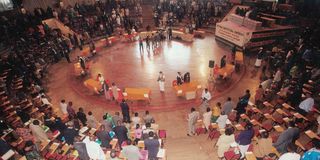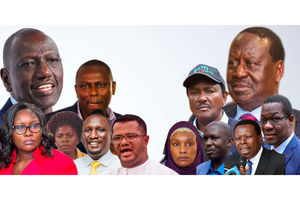Happening now: Liveblog: Kenyan youth stage #OccupyEverywhere protests

Kenyans attended the National Constitutional Conference at the Bomas of Kenya in Nairobi in 2010.
In 2019, I published a book with Booktalk Africa, a publishing house in Nairobi, under the title, Presidential or Parliamentary Democracy? Choices to be Made. I thought that the book, published well before the 2022 General Election, would have had an impact on these elections by political leaders and political parties addressing some of the issues I had raised, and abandoning the project of electing the president as the center piece in building our democracy. I was wrong.
Most of the concerns I had raised were either not paid attention to, nor taken into account, in that election. Parties were formed day and night, and a plethora of candidates contested the presidency, each promising their largely ethnic constituencies that they would bring home a president, and thereby get a government which would serve them better.
Except for the Narc government formed after the elections in 2002, and the coalition government of 2007, none of the governments elected since then has paid sufficient attention to democratic governance in our republic.
Almost without any exception, the presidents have almost always used state power for personal aggrandisement while dishing out jobs, business and national wealth to their ethnic support bases. This, unfortunately, does not unite the nation; it divides it. Both in 2002 and 2007 Kenyans were very lucky: We had political parties which coalesced around one presidential candidate called Mwai Kibaki who was a product of the nationalist movement for independence, and a scholar to boot.
Democratic governance
He understood, appreciated and was committed to democratic governance. Getting such a person is not always easy; such people may come about once in a long time. Hence the building of democracy should not depend on “good individuals” but on “democratic institutions” and “democratic rules of the game”.
The founders of democracy were very clear on this. Notwithstanding its Athenian, and generally western origin, the democracy we know today in Kenya is associated very much with how it has been practiced in Great Britain and the USA, associated mainly with the ideas of George Washington and Abraham Lincoln, especially regarding institutions that safeguard it.
“Government of the people, by the people and for the people”, which Abraham Lincoln promised the American people in 1863 after a bloody struggle against political tyranny, became the cardinal phrase in defining American democracy after that. In the Africans’ struggle against colonialism, it became the clarion call by African nationalists as well.
It is imperative to note that, in this definition of democracy, “government for the people” refers to representative democracy. Here, of course, the people means the individual citizen qua individual citizen, within the citizenry as a whole, freely elects those who govern them. Democracy has never been bestowed on any group of humankind as a gift from God. Its birth has always been a vicious, if not entirely bloody, struggle between the privileged classes or social strata, and the underdog or subaltern classes or communities — very often economically exploited and politically oppressed by their rulers.
13 colonies
In the case of Britain, a monarch (Charles 1) was executed in 1641 so that the people’s representatives in Parliament could take charge of politically running the country. In the case of the USA, the largely English emigres who had founded 13 colonies there decided to unilaterally declare independence from the motherland by a declaration which stated how they would govern themselves. The so-called Universal Declaration of Independence of 1776, like our own independence constitution of 1963, laid down the principles of governance largely on democratic terms.
But democracy, once established on paper, can easily be abused in practice by powerful and privileged social classes in society. This has happened almost everywhere. In the case of the US, the first to abuse it were the white slave owners who denied the slaves the right to be human beings covered by the declaration that “we hold these truths to be self-evident: that all men are born equal”.
The slaves could not vote, own property or elect and be elected to representative institutions. African countries since independence have seen ethnic communities, racial groups and large sections of the poor being excluded from the self-evident truth that all people are born equal; and that this equality entitles them to some universal rights.
Poor neighbourhoods
In the US the Civil Rights Movement, started in the middle of the 20th Century by people of color, waged a struggle for an end to racial segregation, oppression and exploitation. Leaders like Malcolm X, Martin Luther King, and Stokely Carmichael rose to International fame by their brave and principled leadership that even led to their assassination by the powers that be.
Although black people won the struggle to vote and to be elected to representative institutions, they have had limited success in the struggle for economic rights. The majority of African Americans still live in poor neighborhoods, only have access to low paying jobs and have to make do with poor health services. The US is still largely a “disunited states” in human and people’s rights.
We in Africa are no different. After the successful struggle to win independence for the people as a whole in the sixties — and in the case of South Africa to get rid of white racial domination in 1994 — the bottom of society is almost back to square one. Whichever index one uses to measure economic and social development in Africa, African nations tend to fall at the bottom of the list globally in terms of GDP per capita, income per capita, human development indices, population living under poverty level, etc.
Yet in the middle of all this poor performance, a small political and economic elite remain economically rich and politically powerful, enjoying western-style standard of living and are not ashamed to decry the poverty of their people because, according to them, they are doing their best to change things for the better. Why, then, don’t the people revolt against this social and political order as the civil rights leaders did in the US? The answer is very simple: Tribalism. The ideology of tribalism brings the rich and poor together in every tribe, especially in a presidential regime. The majority in one tribe begin to identify with the regime, giving it political support and legitimacy, each person emotionally identifying with the president if she/he is their own capable of bringing the benefits of political power home.
Consequently, political elites in those ethnic communities not in political power begin organising in time for the next election in no different manner, thereby perpetuating the presidential authoritarian political system that John Githongo says legitimizes the dangerous and non-developmental ideology of it is our time to eat.
Ethnic political terrains
I do not therefore think that initiatives like Limuru III will help Kenyans very much. Truth be told, it will, most obviously, help those who have started early to organise politically along the ethnic political terrains of capturing the presidency within the framework of ethnic elite power which has been the key factor in Kenya’s political and economic underdevelopment since independence. What we need is not a Limuru III, but a Bomas of Kenya III. A convention of the representatives of all Kenyans revisiting the Constitution so as to institutionalise a national democratic and developmental Kenya.
If the presidential system of “democratic governance” compels the elite to organise tribally all the time, thereby reducing the chances of the emergence of a national democratic and developmental state (which all Kenyans desire), why must we remain slaves to this retrogressive so-called presidential democracy? This is the point I am making in my book Presidential or Parliamentary Democracy: Choices to be Made. It is still available in the bookshops. Like the late Amilcar Cabral of Guinea Bissau observed, one of the ways in which we can die a tribe and be born a nation is by forsaking this retrogressive so-called presidential democracy and resurrecting the parliamentary system of democracy that we had at independence.
A political party that brings people from diverse communities because of its policies, and win a majority in an election can form government and rule our nation more democratically than the shenanigan we are seeing in Kenya at the moment. Where no political party wins a majority — like happens so often in Germany — then a coalition can be formed which will be representative of the various interests therein. Governing through coalitions creates an environment where political extremists are much easier to tame than in monolithic party systems where the tyranny of one man can run down a whole society.
Multiple political parties
It is therefore rather ironical in Kenya that we form multiple political parties, especially before elections, then form coalitions to win those elections. That’s fine. But then when we seek to collapse these parties into one monolithic party in time for the next election it does not make sense.
There is a much higher probability that such a party soon begins to be captured by its leadership, not to represent the people, but to gather enough votes to win the presidency. What happens after the winning of the big prize is anybody’s guess. The President will very soon begin to figure out yet another formula for putting together a coalition of tribal leaders to put together enough numbers to win the next election. The most important game in town is to win and to rule; never to win and Kenyan society put a national democratic and mould developmental community in the interest of all of us.
From the above, the conclusion is simple. So-called presidential democracy will always undermine the growth and stability of political parties. Political parties, however, have proven to be the engines that drive democracy in choosing governments which truly “governments of the people, by the people and for the people”. And such a government, in our case, needs a political framework that can shape, mould, build and sustain it because it is national, developmental and democratic.
Let us now go back to Bomas III and discuss how we change the Constitution to accommodate a parliamentary system of government in time for the next general election. If we don’t plan properly for our future, we will continue to fail our country.
The writer is the Governor, Kisumu County








